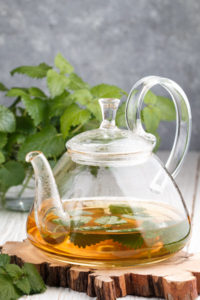Table of Contents
When something happens during your day, regardless of what that stressor is, your body responds the same way every time. Your HPA axis kicks in and sends a cascade of hormones into your system. Dominated by a flood of cortisol from your adrenals. To fight the effects of stress in your body.
This stress response can be caused by fear or anxiety set off by a remark from your spouse, someone cutting you off in traffic, not enough sleep, excess exercise, illness, or the ongoing threat of contracting COVID-19.
When the stress ends, your body is designed to return to normal. But the thing is, in our modern world, and for most of us, the stress often continues. The symptoms stay under the radar and we’re not aware of it.
The symptoms of chronic stress show up as brain fog, anxiety and depression, weight gain around your waist, not feeling rested after a night’s sleep, and catching every cold or flu bug that’s going around.
As a neurohacker working on optimizing cognitive performance, it’s important to realize that chronic stress and cortisol will damage your brain. And work against everything you’re trying to do with nootropics.
Fortunately, you have easy access to an elite-class of nootropics that help your body cope with stress. And avoid the damage it can cause. Bringing your body back into a balanced, healthy, optimized state. They are called “adaptogens”.
Stress causes brain damage
Neuroscientists at the University of California, Berkeley found that chronic stress triggers long-term changes in brain structure and function.[i] Chronic stress changes neural networks.
Cortisol creates a domino effect that hard-wires pathways between the hippocampus and amygdala. (The amygdala (lizard brain) is the area responsible for your fight-or-flight response).
This hard-wiring caused by stress is not the way your brain was designed. But chronic, ongoing stress tricks the brain into rebuilding circuits and hunkering down for the long haul.
This re-wiring appears to be permanent. Unless you intervene with something like an adaptogen.
Chronic stress seems to ‘flip a switch’ in stem cells in the brain. And turns them into a type of cell that prevents connections to the prefrontal cortex. Preventing learning and memory.
And laying down the scaffolding linked to anxiety, depression and PTSD (Post Traumatic Stress Disorder).
What is an adaptogen?
Humans have been using plants for food and medicine for thousands of years. Emperor Shen-Nung, the 2nd of China’s emperors (3500-2600 BC) catalogued over 365 species of medicinal plants. Many of which are still used in traditional Chinese medicine today.[ii]
Of those medicinal plants, a couple stand out as unique in their ability to help humans cope with physical and mental stress. Other cultures and ancient healing systems have since added to this short list. We now call these herbal remedies “adaptogens”.
The word adaptogen is derived from the Latin adaptare (to adjust or adapt). It was first used by Soviet physician and scientist Nikolai Lazarev in 1947. Lazarev was joined by Dr. Israel Brekham, and as a team began the search for botanicals with adaptogenic qualities.
The first plant the team studied was Panax Ginseng which has been in use for millennia. And was written about by Shen-Nung as a remedy over 5000 years ago.[iii]
The definition of “adaptogen” includes “metabolic regulators (of a natural origin) which increase the ability of an organism to adapt to environmental factors and to avoid damage from such factors.”
It turns out that many of these “metabolic regulators” are compounds found in certain plants that help them cope with growing in a stressful environment.
These compounds help plants adapt to extreme temperatures, resist insects that would otherwise do them harm, or cope with toxins drawn into the plant from the soil it’s growing in.
Ancient medical practitioners discovered that a few of these plants, or compounds derived by extraction, transferred their benefits to humans. And help us cope with various kinds of stress too.
How Adaptogens Work
Adding adaptogens to your stack can improve alertness, concentration, focus, learning, memory, mood and reduce brain fog. But the primary purpose of adding an adaptogen to your nootropic stack is to reduce physical and mental stress. And bring balance back to your life.
Each herbal supplement classified as an adaptogen has a different mechanism of action in your brain and body. But overall, adaptogens work by:
- Balancing the production of neurotransmitters
- Boosting brain cell signaling
- Improving cerebral blood flow
- Modulating brain waves
- Protecting from brain cell damage
- Eliminating heavy metals and toxins
- Promoting neuroplasticity
- Upregulating BDNF and nerve growth factor
Herbal adaptogens are known for increasing your resistance to both mental and physical stress. They offer the ability to adapt to stress more easily. No matter the cause. It could be a hectic calendar, extremes in hot or cold, noise, changes in altitude, exposure the toxins in food or the environment, illness, or physical exertion from exercise or work.
The beauty of using any of these nootropics is not only protecting you from stress. But they can also boost cognition, improve your reflexes, provide clearer thinking, and even improve your memory.
Best Adaptogen Supplements
The best adaptogen supplements for nootropic use make up a short list. This elite class of herbs can have a profound effect on cognition and brain health.
Natural adaptogens are easy to find in local vitamin shops and health food stores. And most of the online retailers that sell dietary supplements carry the adaptogens listed below.
Each nootropic below features a live link to a full adaptogen supplement review. The detailed article on each includes the history and why it’s used as a nootropic, how it works in your brain, clinical studies, recommended dosage, possible side effects and the best form to buy.
Ginseng
Ginseng – Instead of reaching for an energy drink, another cup of coffee or an Adderall to give yourself a boost – try Ginseng. One study with 30 healthy young volunteers demonstrated the power of Ginseng. Participants were given 200 mg or 400 mg of Panax Ginseng extract (G115) then asked to perform various tests.
The most noticeable effects were found at the lower 200 mg dose. An hour after supplementing with Ginseng extract both groups had lower blood glucose levels. But the biggest improvement in mental performance and reduction in fatigue during sustained mental activity were with the lower dose group.[iv]
Asian Ginseng (Panax ginseng) has been used for over 5,000 years as an herbal remedy.[v] Panax means “cure-all” in Greek. This potent adaptogen reduces adrenal fatigue, and boosts GABA. Providing an anti-stress effect.
Ginseng also stimulates the formation of new blood vessels in your brain which improves blood circulation. Ginsenosides increase protein synthesis and the activity of neurotransmitters. All of which improves alertness, reduces mental fatigue, boosts memory and overall cognition.
American Ginseng (Panax quinquefolius) is preferred by many neurohackers over Asian Ginseng because it’s not as stimulating. And it’s produced under stricter conditions than any other ginseng. Studies show American Ginseng has a profound effect on enhancing memory after a single dose.[vi] And like Asian Ginseng, is a great choice for relieving anxiety.
Gotu Kola
Gotu Kola – This adaptogen is often called “the student herb” in Bali. Because Gotu Kola increases dendrite and axon growth in brain cells which helps memory.[vii]
Gotu Kola also helps prevent the breakdown of acetylcholine which enhances cognition, learning, memory and mood.[viii] Some neurohackers report it as effective at reducing anxiety and relieving stress as Ashwagandha and Phenibut. As a bonus, Gotu Kola helps protect your brain from toxins and oxidative stress.
This ancient Ayurvedic herbal remedy, Gotu Kola was used just like a first-aid kit. It was used to treat mental fatigue, anxiety, depression, memory loss, insomnia, fever, syphilis, hepatitis, epilepsy, diarrhea and asthma.
Ashwagandha
Ashwagandha – Native to India, Pakistan and Sri Lanka, this potent herb is one of the most powerful in Ayurvedic medicine. And stands shoulder-to-shoulder with some of the most potent prescription drugs used to treat depression and anxiety.
In Sanskrit, Ashwagandha means “smell of horse”. Meaning this herb imparts the strength and vigor of a stallion. It helps relieve anxiety and depression by reducing the stress hormone cortisol. And by enhancing GABA and serotonin receptors in your brain.
Studies show that Ashwagandha helps regenerate axons, dendrites and synapses. Restoring neural networks needed for memory. The extract of this herb inhibits the enzyme acetylcholinesterase.[ix] Which keeps more acetylcholine available for cognition, learning and memory.
After a study at Asha Hospital in Hyderabad, India, researchers concluded that “a high-concentration full-spectrum Ashwagandha root extract safely and effectively improves an individual’s resistance towards stress and thereby improves self-assessed quality of life”.[x]
Lemon Balm
Lemon Balm – As an adaptogen, Lemon Balm is most commonly used for stress relief, and to reduce panic attacks.
The rosmarinic acid in Lemon Balm provides anti-anxiety effects by inhibiting the GABA transaminase enzyme. Which helps maintain adequate levels of GABA in your brain needed for regulating mood.
Rosmarinic acid also provides an anti-depressant effect in your brain by downregulating mitogen-activated protein kinase phosphatase-1 (Mkp-1). And by upregulating brain-derived neurotrophic factor (BDNF), along with boosting dopamine synthesis.[xi]
Another active component in Lemon Balm called eugenol works as a powerful antioxidant. Naturally eliminating free radicals that would normally damage brain cells.
The bottom-line is Lemon Balm helps anxiety, concentration, depression, focus, irritability, learning and memory. Some reviewers say using Lemon Balm works as well as prescription Xanax. Without the side effects.
Ginkgo Biloba
Ginkgo Biloba – In the most ancient medical text we’ve found so far, the Chinese Materia Medica (2800 B.C.) lists Ginkgo Biloba for asthma, swelling of the hands and feet, coughs, vascular disorders, aging and for the brain.[xii]
Modern science tells us how Ginkgo works. It acts as a monoamine oxidase inhibitor (MAOI) which reduces levels of monoamine oxidase (MAO) in your brain. MAO breaks down dopamine. Inhibiting MAO increases dopamine levels which helps reduce anxiety.[xiii]
Ginkgo also helps increase cerebral blood flow which improves oxygen and glucose delivery to fuel brain cells. Improving cognition, learning, memory and recall. And it reduces oxidative stress by eliminating free radicals. Keeping brain cells healthy.
One important thing to note if you decide to try Ginkgo. User reviews and studies have consistently shown that it may take several weeks of supplementing with Ginkgo before you realize any benefit. But once those benefits start to kick in, this adaptogen may become a permanent part of your nootropic stack.
Bacopa Monnieri
Bacopa Monnieri – Bacopa is considered by many to be the best nootropic available today. It’s an adaptogen because it helps prevent the chemical and physical effects of stress. Instead of simply suppressing them like many prescription antidepressants and anti-anxiety drugs.
The ancient Ayurvedic texts first recommended Bacopa to devotees as a way to help memorize long passages of text. The bacosides A and B in Bacopa improve signaling between neurons, and help rebuild damaged brain cells. It’s been shown in studies to boost word recall, attention and memory, improve focus, and lower anxiety and heart rate.[xiv]
Researchers at Banaras Hindu University in India showed Bacopa as effective for anxiety as the benzodiazepine drug lorazepam. One of the side effects of lorazepam is memory loss. Bacopa Monnieri on the other hand, reduced anxiety while boosting cognition.[xv]
If you’re thinking of trying Bacopa but need a little more convincing, I recommend reading the extended review here on Nootropics Expert. Particularly the section called “Bacopa Monnieri benefits”. It digs down into the molecular evidence on how this adaptogen works.
Rhodiola Rosea
Rhodiola Rosea – Rhodiola has an amazing ability to help you overcome fatigue and exhaustion caused by physical and mental stress. Rhodiola is known for improving alertness, energy, memory and mood, is anti-anxiety and anti-depressant, reduces fatigue, and boosts cognition and concentration.
The active components in Rhodiola collectively known as rosavins along with salidroside and tyrosol provide its benefits. It reverses damage to neurons caused by chronic stress. And it promotes key neurotransmitters like serotonin, norepinephrine and beta-endorphins which help reduce stress.
Rhodiola also prevents and repairs damage caused by C-reactive protein and free radicals. It even helps regenerate neurons during periods of stress. In part by boosting the synthesis and re-synthesis of ATP. Your main cellular fuel source created in mitochondria.
Clinical studies and user experience show you get the full benefits of Rhodiola Rosea by supplementing with this adaptogen for 30 – 40 days.
Add Balance to Your Nootropic Stack
Some of the adaptogens reviewed in this post have thousands of years of science supporting their use. Some of the ‘newer’ adaptogens like Lemon Balm have dozens of clinical trials and hundreds of years of practical use proving their efficacy in treating stress.
When used according to dosage recommendations, side effects are few or non-existent with adaptogens. These natural herbs simply bring balance back to your body and brain.
Effectively treating stress often results in the added benefits of better memory and learning, less physical and mental fatigue, elimination of anxiety, and a better mood for a much more pleasant quality of life.
Living in this modern world makes it nearly impossible to bring balance back to our dysfunctional lives without the intervention of nootropics. And particularly an adaptogen or two.
Some of the higher quality, pre-made nootropic stacks like include adaptogens in their formula. For example, Mind Lab Pro® contains effective amounts of the anxiety-reducing adaptogens Bacopa Monnieri and Rhodiola Rosea. So read nootropic supplement labels carefully before making your selection.
You’ll find that selecting the right adaptogens for your nootropic stack will often improve the effectiveness of racetams, choline supplements, and other nootropic compounds.
If you’re dealing with chronic fatigue, low energy levels, poor memory or ongoing stress – do yourself a favor. Add an adaptogen to your daily supplement regimen. And start enjoying life again.









Join The Discussion - 99 comments
Lynn
November 27, 2020
Hello, Do have some anxiety, and wake up with it, very early, but it starts with feeling too cold or warm, then loud HB, then anxiety (then need to urinate). Was guessing a biochem – mineral or hormone or neurotrans imbalance. Have tried lemon balm in past (also st johns(aweful),oat straw) and both made me feel depressed or very blaw. Gotu kola was helpful (plant dyed during bad heat wave). Curious what that was from. Was told by might be ADD, so will ck out your page on that.
Am trying thiamine (have defic symptoms) but caused good then poor symp., so am trying on skin and seems helping.
David Tomen
November 28, 2020
Lynn, you have some great clues on what is causing your anxiety just by your success or no success with the supplements you have tried.
Lemon Balm increases acetylcholine, GABA and dopamine synthesis. Oat Straw increases dopamine. Gotu Kola increases acetylcholine.
I suggest you try directly increase GABA with a GABA supplement for a couple of days and see if that helps. Then try L-Tyrosine for a couple of days and see if that helps. The try Alpha GPC or CDP-Choline for acetylcholine and see if that helps.
If you get 2 or 3 that seem to help then put together a nootropic stack with those supplements. And use them following dosage recommendations for each supplement which you’ll find on this list: https://nootropicsexpert.com/nootropics-list/
And they do sell Gotu Kola supplements you know. They don’t die in the heat and are easier to take. 🙂
Mick
May 8, 2020
Hi David,
After a few years of adding new nootropics my stack became very big.
Morning stack:
1 Ashwagandha
2 Gotu Kola
3 Korean Ginseng
4 Holy Basil
• Phosphatidylserine
• L- Theanine
• N-Acetyl L-Cysteine
• DHA
• B Complex
• CDP Choline
• Aniracetam
(Some of them I have to take more than one capsule)
And at the moment I need to add 3 or 4 new nootropics to my stack to treat Traumatic Brain Injury (TBI). My biggest problem was always social anxiety. Even before I started taking nootropics I had very little anxiety when I was at home, or in my car, or visiting my friends and family. It’s usually with people that I’ve never met before, with strangers. At the moment I’m taking 4 different adaptogens in my morning stack. I do feel they help with anxiety, but for me I don’t think they help much for social anxiety. Some of the nootropics that I want to add to treat TBI like Lithium Orotate can also treat social anxiety.
I would like your opinion if I can remove 1 or 2 adaptogens from my morning stack (may be 4 of them work in the simular way, and there’s no need to keep 4 of them). And replace them with nootropics like Lithium Orotate. If you think it’s a good idea, which one or two out of 4 should I remove?
Sorry for such a long message. Any help would be greatly appreciated.
David Tomen
May 10, 2020
Mick, if two or more nootropics or adaptogens provide the same or similar benefit then it makes sense to use only one or two. But I can’t tell you which ones to eliminate or replace because only you can know which work best for you.
You may want to try eliminate one from your stack and see if you feel a difference. If not then you know which to stop using. Go through each one that you are considering replacing or stopping and try removing one at a time.
Mick
May 10, 2020
Ok David I will try it. Thank you.
Kelly Schultz
April 8, 2020
Any idea if it is dangerous to take any anti anxiety supplements with Buspar? I have been looking at Magnesium, Myo inositol, GABA, valerian, and l theanine. I am trying to go more natural instead of adding more meds, but unfortunately, the doctors and pharmacists don’t seem to know much about these supplements. Thank you!
David Tomen
April 23, 2020
Kelly, Buspirone affects serotonin, dopamine and norepinephrine (https://en.wikipedia.org/wiki/Buspirone). You do NOT want to combine it with any nootropic supplement that affects or boosts any of those neurotransmitters. Because if you do you can have very serious problems.
Each of the nootropics on Nootropics Expert explains in detail how they work in your brain. Including if they affect one or more neurotransmitters.
Danny O
December 12, 2019
A friend of mine was just prescribed Lexapro by her doctor to deal with anxiety, stress and depression. Are any of these nootropics a bad fit while being on this drug to your knowledge? From my understanding, the drug is an SSRI.
David Tomen
December 12, 2019
Danny, Lexapro (Escitalopram) affects serotonin and serotonin transporters. So you need to check and see if any of the adaptogens in the list above affects or works with raising serotonin. Those need to be avoided. And the manufacturer warns about using anything that acts like a MAOI as well.
Looks like that would mean avoiding Ginseng, Ashwagandha, Ginkgo Biloba, and Rhodiola Rosea to start. You’ll need to double-check the other 3.
Ray
November 11, 2019
Dave, ALCAR is mentioned as benefiting mitochondria and ATP. So can I stack it with rhodiola?
David Tomen
November 12, 2019
Ray, absolutely you can stack them.
Ka
October 16, 2019
It sounds too good to be true… ! I am left wondering if it is safe to use nootropics/adaptogens for my 12year old boy (anxiety) and my 14year old girl (adhd and learning issues). Can I do harm …? developing brain, hormonal effects,… ?
David Tomen
October 16, 2019
Ka, adaptogens like Gotu Kola and Lemon Balm are some of the safest dietary supplements available. And each of the nootropic adaptogens I’ve described in brief in this post are linked to clinical studies. Then each of the nootropics in this post also link through to a full review. Each of which include references to dozens of clinical studies from around the world.
I suggest you see what verified reviewers have to say about a particular supplement on a site like Amazon.
But of course each of these nootropics must be used wisely. Some can cause harm if they are contraindicated with prescription medications. Or with other supplements. Or dosage recommendations are not followed.
Also keep in mind that dosages on Nootropics Expert are for adults. That’s not to say younger people are excluded. But the human brain continues to develop well into your 20’s. So you want to avoid any nootropic that will significantly change brain structure. Once you decide that a supplement looks safe to use then reduce the lowest recommended in dose to half or less.
And of course none of this is offered as medical advice. Please continue to do your research and be careful.
Missy
April 24, 2019
If taking several of these at once how do you manage doses – lower or keep the recommended daily dose for each separate adaptogen?
David Tomen
April 25, 2019
Missy, I suggest trying one at a time and see how it makes you feel. If something works then add another and see if that works too.
If you end up stack several of these nootropics then select the lowest recommended dosage for each.
EB
September 7, 2019
Thanks for posting about this. I am interested in reading your book!
Would these things help with OCD? I was told to take Zoloft but I do not want to take that, I fear the side effects. The only thing that gives me relief is anything that affects GABA like prescription anti anxiety medication. Being a Virgo rising also does not help ha. It honestly makes me skeptical of everything I put in my body regardless of whether or not its natural or pharmacuetical. Perhaps I will try the lemon balm and ginseng.
David Tomen
September 9, 2019
Do a search using the function top right for all nootropics that effect GABA. And then do two more searches for these keywords “OCD” and “Obsessive Compulsive Disorder” and see what turns up.
AB
March 15, 2019
You are the best! Can you tell me the consequences of one Now brand Dopa Macuna to help with dopamine and added Bacopa or Rhodiola? I’m trying to balance dopamine and serotonin. I had my 23andme raw data sent to Self-Hacked for further analysis for neurotransmitters/mood and it came back that I have mutations for SAD and low dopamine and serotonin. This has been a few years of chronic stress and I am having a hard time getting energized/motivated. And life demands I get motivation quickly. I use a 200 mg theanine every day and most days phosphatidylserine also as well as Krill oil and B complex and T3 for thyroid. I take a 500 mg tryptophan at night (recently). CBD isolate does nothing for me and I can’t take any THC at all so the CBD entourage is out although my genetics came back low on CBD receptors also.
David Tomen
March 16, 2019
AB, for boosting dopamine you can use Dopa Mucuna from NOW Foods or L-Tyrosine or N-Acetyl L-Tyrosine (NALT). You can also get high quality NALT in Mind Lab Pro which includes Bacopa and Rhodiola and save a little money.
David Tomen
March 16, 2019
AB, for boosting dopamine you can use Dopa Mucuna from NOW Foods or L-Tyrosine or N-Acetyl L-Tyrosine (NALT). You can also get high quality NALT in Mind Lab Pro which includes Bacopa and Rhodiola and save a little money )https://nootropicsexpert.com/mind-lab-pro-review/).